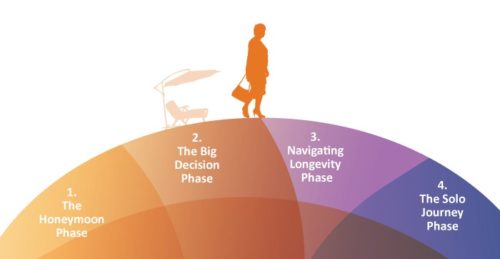Don’t Get Stuck in the Honeymoon Phase of Retirement
You have worked your whole life to save for retirement. You anticipate having freedom and time to do whatever you want.
However, many people struggle with the transition into retirement.
What is the Honeymoon Phase of Retirement?
According to Dr. Joseph Coughlin, there are four phases of retirement.
The first being the honeymoon phase. If you pay any attention to advertising, you might be expecting your retirement years to be filled with beaches, bike riding, golf, and whatever else strikes your fancy. Once you stop working, it’s true that you will have more time on your hands to do the things you love.
But those romantic advertisements neglect to tell you something.

Once these activities become a routine, they might not continue to provide the happiness you were hoping for. Instead of being stressed in your working years, you might find yourself bored and restless in your retirement years.
The Honeymoon Will Not Last Forever
Retirees will experience different levels of financial, cognitive, physical, and social resources throughout their retirement years. The longer you are in retirement, the more these resources will diminish.
Let me explain. Financial resources tend to be the highest in the honeymoon phase of retirement because retirees have just started to spend their savings. Aging, for the most part, hasn’t taken its toll on the body and mind at this point either. Because of this, your lifestyle and health can feel similar to life during your working career.
How You Can Survive – and Thrive – in the Retirement Honeymoon
The first stage of retirement is often the hardest to adjust to. Recent retirees have to re-establish their routines, roles, and relationships.
-
Breaking your life-long Routine.
Get up. Get ready. Eat breakfast. Go to school or work. Come home. Eat. Go to bed.
Sound familiar? We’ve all been doing this since kindergarten. Retirement can break this routine since there is nothing forcing you into this habit anymore. You now have so much time on your hands. All this freedom can sound enticing, but if you’re not sure what to do with it, boredom can set in very quickly.
-
Roles will Change.
Your career probably gave you a sense of pride, purpose, and self-fulfillment. Once you retire, you might miss that identity and sense of accomplishment. If you are not prepared for this big change, you might feel under-appreciated and lost in a world without structure.
Your family might also have assumptions about your new life. They may want more of your time and energy. Set boundaries for yourself as you re-discover your new identity as a retiree.
-
Relationships will change.
Once you stop working, you might miss the socialization, intellectual stimulation, and sense of accomplishment from the career you built.
In the honeymoon phase of retirement, you will likely spend less, if any, time with co-workers and more time with your spouse. This is a big adjustment, especially if you and your significant other don’t share similar interests or social groups. If you haven’t thought through this transition, sharing chores, how to spend leisure time, and managing the household can also turn into conflicts.
You should also think through the amount of assistance you are able to provide for family members, like aging parents. If they need financial support, this can cause stress on your relationships if you have little flexibility in your retirement budget.
Tips for a Smoother Transition:
- Plan your new routine – How do you plan to spend your time? What are your hobbies? What actives will fill your day? Take some time and plan out your new routine. Think about your long and short-term goals. Moving towards these goals can be very fulfilling and could give you a sense of purpose.
- Do some soul searching – Retirement is a big change and requires a new identity. Maybe you will get involved with a local non-profit or learn a new skill like woodworking.
- Develop new relationships – Look for ways to replace your work relationships with new ones. Maybe take a class or work part-time to meet new people.
- Give yourself time – You might not find your retirement groove right away, and that’s okay. It can take six to twelve months to really adjust to a new situation and way of life.
- Seek out clarity about finances – Before, during, or after you retire, it’s a good idea to seek out professional advice from a fiduciary financial advisor. They can help you understand your financial situation and create a retirement income plan.
Thriving in Retirement Still Involves Work!
Defining your new role, routine, and relationships will take time, planning, and effort. You might even be pushed out of your comfort zone, but it’s so worth it. Think of the alternative—a boring and lonely retirement.
As you near retirement, it’s easy and understandable to feel anxious for all the change. You will have a smoother transition if you have a proper plan in place and know what to expect.
Rather than viewing retirement as a single “life stage”, you might benefit from having a conversation with your financial specialists to reflect on all the phases of retirement and plan accordingly.

